Stan Eldon Profile
b. 1936
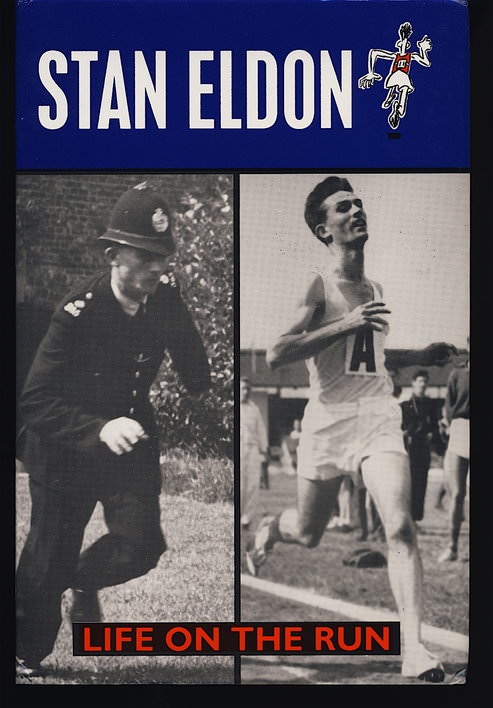 |
The British distance-running scene was already at a pinnacle in the mid 1950s, with such stars as Pirie, Chataway, Ibbotson and Sando. So when Stan Eldon suddenly appeared on the scene in 1958, it was quite a surprise to see him challenging these top runners with such assertive front-running tactics—and more often than not beating them. Seldom has a runner appeared on the scene with such aggressive tactics. The press took notice of this courageous newcomer who tried to run the stars into the ground, playing up the fact that he was a policeman.
In 1958, after showing some good form the previous year and earning his first international vest, Stan Eldon was suddenly one of the best distance runners in the world, winning the International Cross-Country, placing fourth in the European 10,000, and breaking the British 6 Miles and 10,000 records. In his opinion he had an even better year in 1959 when he ran his best 5,000 time and recorded several international wins. But then things started go wrong. He was not such a dominant runner in 1960 and was not chosen for the Olympics. Although he kept running for a few more years, he ever regained the form of 1958-9. As Neil Allen wrote, Eldon’s was a “meteoric career.”
Boyhood
Like many English runners of his time, Eldon was inspired by the 1948 London Olympic Games. As a 12-year-old living in Windsor, he watched the marathon at the cinema. “I wanted to do that,” he said. “That’s what inspired me.” Later on, one of the runners in that marathon, Stan Jones, became Eldon’s advisor and a lifelong friend. But before running became a big part of his life, Eldon did a lot of cycling. At 12 he began to work as a delivery boy for a grocer. “My main task was riding one of several ancient delivery bikes…. I was always carrying the maximum load.” (21) He also made long trips on his own bike—100 miles to see an aunt and 80-mile trips to see relatives in Wiltshire.
Such stamina-building cycling was good preparation for his running career. Indeed, he won his first ever race, a Windsor Scouts cross-country race, when he was 12. The following year he was competing with boys two to five years older; the year after that he was beating them. An early 880 victory (2:26.2) in 1950 encouraged him to start training seriously in 1951. That year he was 7th in the All-England Schools 880, after winning his heat in 2:08.4. At 16, his 880 time was down to 2:01.6, while his Mile PB dropped to 4:29.6, a time he achieved after cycling 84 miles to the race venue.
Policeman, Soldier
After leaving school, Eldon kept up his running in 1953 but did not improve. He was dealing with many changes in his life, the main one being his enlisting in the Police Force as a cadet. Apart from adapting to being a policeman, he became involved in the Windsor Parish players as an actor and in the Anglican Young People’s Association. He was also busy courting his future wife Marion.
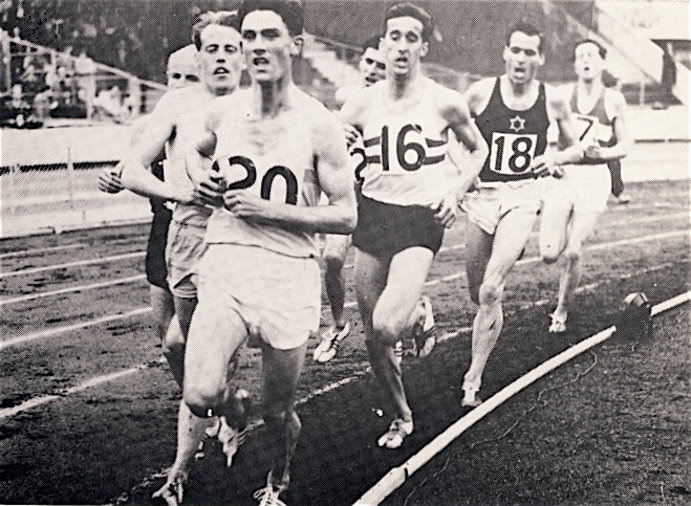 |
| Not yet 22, Eldon leads two great British runners, Derek Ibbotson and Gordon Pirie (16) |
His running career took off again in the 1954 cross-country season, where he won ten races in a row. His best runs were in the Youth Southern and National with 2nd and 9th placings. That summer, after winning the Senior Berkshire 3 (14:43.6), he ran his first White City race in the Intercounties, placing 9th.
At 18 he was called up for National Service, joining the Army in July 1954: “We had time to train while in the military. That’s where a lot of us, like Basil Heatley and Gerry North, took off. It was a good way of life. I was the Army 3-Mile champion and Basil Heatley was the Army cross-country champion.”
During his two years of National Service, Eldon put in a lot of training, often running twice a day: “All I knew about training was self-taught. I learnt my craft from running with and talking to other athletes. I did learn a lot from Gordon Pirie. He was very helpful; some of the training I did was based on him. The other influence, whom I never met, was Emil Zatopek. I’ve still got his book today. I learnt from a mixture of people. I never had a coach.” By the beginning of 1956 his mileage was sometimes up to 85 miles a week. He even tried training three times a day, but found that counter-productive.
The Army also gave him many opportunities to compete. In 1955 he was 65th in the Intercounties cross-country, and in the summer he ran an under-19 world best for 3 Miles (14:19). In 1956 running as a cross-country Junior, he was 3rd in the Southern and 9th in the National. In the summer he ran two good times (29:48 and 29:59) for 6 Miles and 14:00.8 for 3 Miles. His 29:48 was a Junior World Best.
First International Vest
In the 1957 cross-country season, Eldon, now back in the police force, improved on his 1956 Junior placings with a 2nd in the Southern and a 4th in the National. His Senior track season started well with a 2nd in the Intercounties 3 (13:49.2). After winning the Southern 3 in 13:49, he ran a surprising 2nd in the AAA 6 Miles. Following a fast first 3 miles (14:10), he took the lead for a while. But with three laps to go he was over 20 yards behind the leading trio of Knight, Perkins and Ken Norris. He looked out of the race, but at the bell he began a frantic sprint, quickly passing Norris, and then catching Knight and Perkins on the last bend. But just when the race looked won, he faded and Knight just caught him at the tape (28:50.4 to 28:50.8). Eldon had arrived. And his 13:52 in the 3 Miles the next day earned him even more prestige.
The selectors were impressed enough to award him his first national vest against France. In the 6 Miles, he stayed with the Alain Mimoun and George Knight for 11 laps, but then the heat got to him. He finished 3rd in 30:40.6. “My first international was a disaster,” he said. “I collapsed in a heap at the White City.” He then went to Poland and Germany on a tour with the Great Britain team but “didn’t do great.”
International Cross-Country Champion
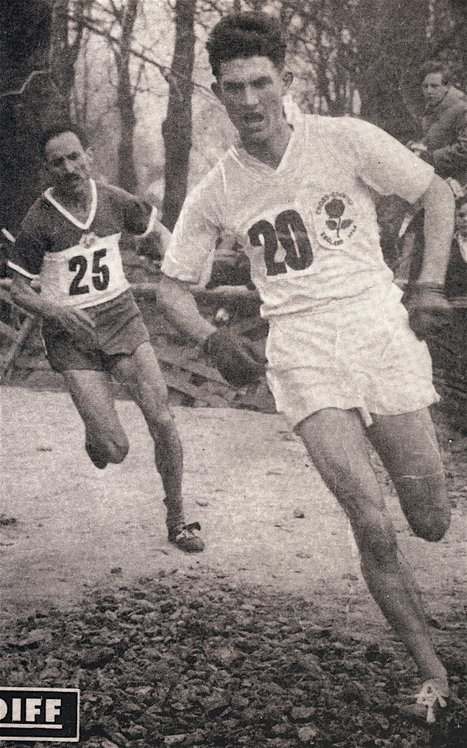 |
| Trying to break Alain Mimoun: Eldon on his way to the the 1958 International Cross-Country title. |
After getting married in October, Eldon upped his training and soon his weekly mileage was up to 100. From the time of his marriage he was able to train 350 consecutive days. After a 10th place in the Intercounties in January, he won the Southern. He was now one of the favorites for the National, but his travel arrangements went awry and he arrived to late to compete. Nevertheless, he was chosen for the International championship to be held in Wales.
His big rival turned out to be Alain Mimoun, who had won three Olympic medals, including the 1956 Marathon. “It was freezing cold,” Eldon recalls. “I ran the same way as I always ran, trying to take the lead, trying to take control. Mimoun was competing for his fifth title. He had beaten me on the track in 1957.” The Times remarked on the fast start: “Eldon went away so fast that one could have believed that he was being used merely as a hare to draw the Frenchmen.” (March 24,1958)
Eldon continued his story: “We broke away from the rest. It was a real ding-dong. He was a very tough guy. Every time we got to a hurdle, he would leap over it and leave me behind. On the other side he’d wave me through. He did this every time; he kept waving me through. On the last hurdle he didn’t wave me through, instead making a dash for home. I thought, ‘Right, now I’m going to go for it.’” At this point, Eldon and his team-mate Sando were close to Mimoun. The Frenchman held them off until the last 60 meters, When Eldon sprinted fiercely to take the lead and win by one second over Mimoun and three over Sando.
All of a sudden, Eldon had made a big impact on the international scene, but not on the track, where he had focused his efforts. “As far as cross-country was concerned, that was my best-ever race,” he asserted. “There were a lot of good people behind me. I wasn’t a great cross-country runner. I could never compare myself to Basil Heatley and Gerry North. They were real cross-country runners.”
British Record
Now he had to turn his good cross-country form into track form. From April he concentrated on quality: “I believed in speeding up through a training session. I might start with 3 laps in 3:20-3:30, and then go down to 800 and then 12x400. A 200 or 100 sprint would finish the session. That 100 sprint was how I could always produce a last lap of 60 or faster at the end of a 5,000 or 10,000 race, no matter how tired I was or what time I was doing.”
| In his familiar leading position, Eldon leads an international field at the White City. Ibbotson, Foord and Knight are in 3rd, 4th and 5th. |
Following a fast 50:52 in the Maidenhead 10 road race (2nd), Eldon started his track season with a 2 Miles victory in 8:53.8 and a PB Mile in 4:09. Then he had a big win in the Intercounties 3 (13:40) and a fast 2 miles in 8:47.6 (4th behind Pirie, Szabo and Ibbotson). Next he improved his 3 Miles PB with 13:37.6 in the Southern, beating Pirie in the process.
Then came his first big track achievement in the AAA 6 Miles. He broke the British Record with the fourth fastest time ever: 28:05.0. The Times reported that “Eldon ran with magnificent courage and yet at the same time obvious intelligence.” (June 30,1958) He dominated the race from the start, leading with miles of 4:34, 4:39 and 4:39 to pass three miles in 13:51.2. He was on his own for much of the race, finishing with a comfortable 11-second margin over Hugh Foord. Afterwards, he felt that he could have gone much faster: “I had a good win and a British record, but it was a wasted opportunity as I know I could have got much closer to Kuts’ world figures,” he wrote later. (p. 65) (The WR at this time was 27:43.8 by Iharos of Hungary; Kuts is estimated to have passed 6 miles in around 27:36 en route to his 28:30 10,000 WR.)
After this race Eldon became a celebrity with television appearances and widespread press coverage. Harold Abrahams wrote to him and told him he could break the WR if he ran an even pace instead of surging. Franz Stampfl was quoted as saying, “A Policeman? I can’t think of a worse job for a world-class athlete. This Eldon must be fantastic to combine the two.” (p.66)
Commonwealth Setback
A week later he ran another blinder, winning the AAA 3 miles in 13:22.4, just outside Ibbotson’s British record of 13:20.8. All three of England’s runners to be selected for the Commonwealth Games--Ibbotson, Pirie and Clark--finished behind him. The race was won in typical Eldon style. He took the lead after two laps, and passing the mile in 4:17.8, he was already on his own. The halfway mark was reached in 6:32, well under WR pace. He was never challenged, finishing 12 seconds ahead of Maiyoro of Kenya.
Despite this 3-Mile victory, Eldon was now labeled as a six-miler, and he was chosen only for the longer event for the Empire and Commonwealth Games in Cardiff. With his fine 28:05 time making him the fastest in the field, he was clearly the favorite. Trying to ignore the heat, he tried to take charge of the race, running a fast first mile under WR speed (4:35). In an attempt to shake up the field, he put in a surge just before two miles (9:15). After relinquishing the lead for the first time on the ninth lap, he surged back in front on the tenth. A lap later he was back in fourth, and despite one last desperate effort, he never challenged for the lead again. Clearly the heat (over 80f/25c), which had affected him before, was too much. He finished a miserable 9th in 30:30.
Right after the Games, he was tested for heat tolerance by Dr. Roger Bannister. “He found that I did have a problem in temperatures above about 70f (20c)” Eldon wrote in his book. “When running in warm conditions my temperature would keep rising; where another runner would steady off at just over 100 degrees, mine would not cut out but keep rising.” (p.69)
Eldon bounced right back. In a match between Great Britain and the Empire he had a great three-mile race with WR-holder and Commonwealth champ Albie Thomas, losing a closely run race 13:20.6 to 13:23. The Times called it “an enthralling struggle between two of the best young runners in the world.” (August 4,1958) In this race, Thomas made use of Eldon’s surging tactics: “I watched Eldon race at Cardiff, then I employed my own surging against his. As he surged, I followed, and as he eased, I surged so he got no rest.” (Personal email) After the lead changed several times, Eldon could not quite hold on to the tenacious Aussie. With 880 to go, Thomas had escaped from Eldon, and he held his lead to the tape. Thomas was timed in 13:20.6 and Eldon in 13:23.0.
European 10,000
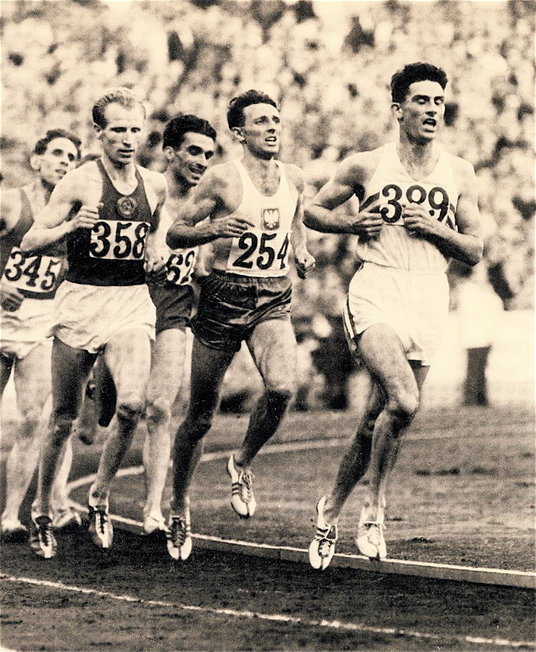 |
| Eldon is caught by the pack with just over two laps to go: Krzyszkowiak (254), Zhukov (358)Pudov (345) and Ozog (half-hidden). |
Now came his biggest test of the season: the 10,000 in the European Championships in Stockholm. “After failing at Cardiff, I really wanted to have a good one,” Eldon admitted. As in Cardiff, he was not intimidated by the occasion of a major championship race. Although not leading from the gun, he did dramatically take charge of the race on the fifth lap. The first K had been run in 2:48, with Ozog of Poland leading. Eldon quickly opened up a 15-meter gap. His lead increased to 25 meters soon after 2k (5:34). After he went through 3K in 8:21, the Russian Zhukov began to slowly pull him back. Still, Eldon had an 8-meter lead at the halfway point. Running without hearing any lap times, he was just ahead of Kuts’ WR speed with 14:14. “I had never run in such ideal conditions as Stockholm, and I did not realize how fast I was running,” he wrote later. (p.70)
But he had not run himself into the ground: “I was feeling good and thought I could maintain all the way through. I just faded a little in the 18-20 laps.” He faded just after he had put in yet another surge to increase his lead to 14 meters. A group of five finally caught him, and with just over 800 to go, Krzyszkowiak of Poland made his move. Eldon was suddenly in fifth place as Ozog, Zhukhov and Pudov went by too. There was still something left in the Eldon tank as he fought back, managing to pass Ozog in the last stretch and getting within one second of a bronze medal. “It was a disappointment,” he said, “but I got the British record [29:03.2]. That was pleasing.” Though some questioned his brash tactics, there can be no doubt that Eldon ran brilliantly for one so young (22) and relatively inexperienced at the international level.
There were several more races in 1958, including a six-mile victory in the Southern (29:06.8), an 8:45 2 Miles, a second place in an international race against France (14:00) and a 13:40 3 Miles in Brighton. He was now a celebrity in England, and the press loved to headline his police identity, calling him the galloping cop or the flying cop. BBC TV and Pathé News both did features on him. At only 22, he seemed likely to become a world beater.
Life at the Top
Eldon considered the next year, 1959, to be his best. True, he didn’t improve on his 10,000 time, and he didn’t win the International Cross-country again. But he did have a successful competitive year on the track, and he did run his all-time PBs for 2 Miles and 5,000. Of course, in the forefront of his mind was qualification for the 1960 Olympics. His cross-country season was affected by a lower-leg injury. This caused him to be less than fully fit for the Intercounties. Surprisingly he still managed an excellent fifth place. He was back in form for the Southern, winning from Sando and Knight. This fine run raised his hopes for a win in the National, but could only manage 5th. And he could not repeat his win at the International, although his 5th place was still an excellent performance.
After some good road races, he began with a 28:48 Six Miles on the track at the Southern, finishing fourth. Following some shorter tune-up races, he had a great race in the Intercounties 3, almost dead-heating with Steve James in 13:36, but getting second place. He ran the 6 two days later, but was only fifth in 29:04.6. Still he was finding his track speed, and in June ran his best-ever 2 Miles in a handicap race (8:40.6).
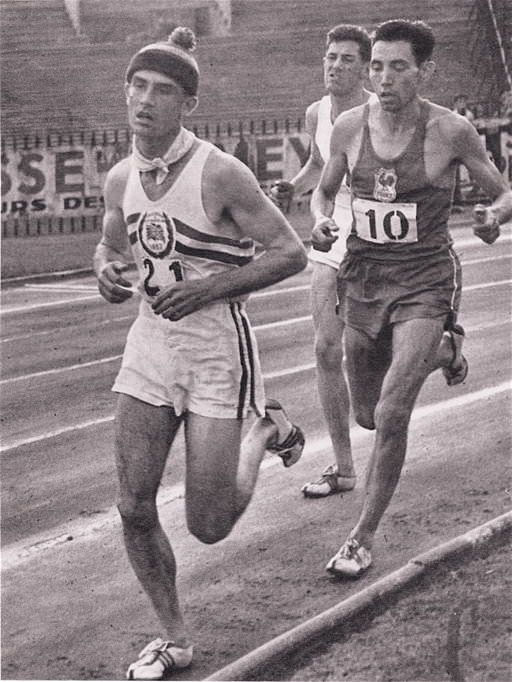 |
| Running a 10,000 against France in winter headgear. Bernard and winner Clark follow. |
Next were two international wins: a 3,000 in France (8:16.2) and a 5,000 in East Germany (14:06.6). In the latter race he did well to defeat Hans Grodotzki, who was to win silver medals in both the 5,000 and 10,000 the next year in Rome. Next up was the AAAs. He won the Six Miles in 28:12.4 and then placed 3rd the next day in the 3 Miles (13:38)—two fine runs within 24 hours.
The next part of his season was a condensed series of six international races, of which he won four and was second in the other two. Clearly he was in the form of his life. This series started with a 6-Mile win against West Germany (28:18.6) and a second place finish behind Zimny in a 3 Miles against Poland (13:27.8). He then went on a tour with the British team to Russia and Finland.
In front of a 100,000 Moscow crowd he won the 5,000 in 13:52.8. “That was a great victory,” he said. Eldon and his team-mate Bruce Tulloh agreed to take turns leading each lap. By the halfway point, one Russian had been dropped. “The other one [Artynyuk] was persistent,” Eldon recalled. “He even tried to take the lead at the bell. I always had a fast finish and took off and built a lead around that last lap, and Bruce did his bit by chasing me home in second place. We ran the Russians off their feet.” (p.85) Eldon led Tulloh home in the next international in Finland for another win in 13:59.4.
His next race was an invitational 5,000 on the famous Turku track: “It was billed as a WR attempt on Kuts’s 13:35. But there were only three other runners, and I lapped one by the halfway mark. Another one dropped out, and the third one was way behind. So it was a solo run; my one incentive was to catch the lapped runner a second time!” Nevertheless, he ran a 13:47 PB, which was just one second a lap slower than Kuts’s WR pace. His last international race was a 3 Miles during the London v Stockholm meet, where he ran a fast 13:25.6 but finished second to Pirie. As usual he pushed the pace for a while, but he was behind Pirie at the bell and couldn’t answer when his old rival sprinted round the last curve.
Setbacks
1959 had been a good competitive year for Eldon. Further, he had been the first Briton to qualify for the Olympics over both 5,000 and 10,000. Everything looked good for 1960. But then things went wrong: he began to have stomach problems that affected both his training and racing. Nothing conclusive was found in medical tests, so he had to endure the problem throughout 1960: “Looking back, and now understanding my problem of diabetes, I do wonder if that was the problem I had then, which very rapidly reduced my capability of running as I had in 1956 to 1959.” (p.89)
The adverse effects from his stomach ailment didn’t show up immediately. He had a pretty good 1960 cross-country season: 5th in the Southern, 3rd in the Nationals and 10th in the Internationals. Moreover, he had an early track success in the Southern 6, winning in 28:44.4. But his track form was erratic. He managed only 4th in the Intercounties 3 (13:54.2) and 5th in a 3,000 (8:15.8). But next he won an international 6 against Italy with 29:30. Then it was back to a poor run over 5,000 (14:33). He finished only 4th in the Southern 3, a race he had won several times. A return visit to Moscow led to poor runs over 5,000 (6th in 14:22.8) and 10,000 (10th in 29:42.8).
With Olympic selection in the offing, Eldon had to run well in the AAAs. And he did. He came 4th in the 6 (third Briton) in 28:19.8, and 5th in the 3 in 13:39.4. Good times but not exceptional. Neil Allen noted a decline in his performances, stating that Eldon was “once indomitable, now only brave.” (The Times, August 1, 1960) Then came the bad news: he was not selected. “I did expect to get selected,” he recalls. “I talked to Jack Crump, one of the selectors. He said that he wanted me to go but that the rest of the selection committee wasn’t sure because of my reputation of not being much good in the heat. They decided that the heat of Rome wasn’t the place for me to be.”
In compensation, the British board sent Eldon on a tour of Nigeria—certainly a warmer place than Rome! He ran two low-key races there, finishing fourth and second. Following this trip he went to Berlin for a 5,000 race against East Germany. He came third in 14:20: “a very disappointing end to a disastrous season that could have been my greatest.” (p.100-101)
Career Changes
The tenacious Eldon took a short rest and then worked up to 70 a week by the end of 1960. Then he had a bad break, a car crash that gave him a “bang on the head.” His 106th position in the Intercounties showed the effects of that accident. But he bounced back with a 9th in the Southern and a respectable 13th in the National. By this time he was back up to 100 miles a week. But all was not well: his left leg “seized up” in the AAA 10; he ran a poor Finchley 20 and got “dehydrated”; he had a “terrible run” in a 2 Miles in Oxford; and then he had an “absolute disaster” in the Intercounties 3 (17th in 14:29). As in 1960, his form was erratic. One encouraging race was the AAA 6, where he finished third in the excellent time of 28:13.4, only eight seconds off his British record.
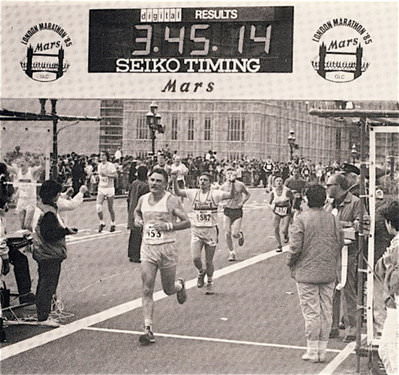 |
| Still running at age 48 |
In that summer of 1961 he was considering several options outside the police force. “By now my serious running career was over,” he wrote (p.105) With less training and fewer races he was able to undertake a second job selling encyclopedias. Soon after, he decided to quit the police. Then, after working for a while with Ken Berry, who was setting up a sports shop, he decided to go into the sports-supply business himself. He wanted to use his own name, but he was told he couldn’t start a sports business under his own name because he was an amateur runner. “I had to write to Harold Abrahams, Chairman of BAAB, and put my case,” he explains. “After some time they said they would approve me to trade under my own name, Stan Eldon Sports Ltd. I was the first. Ron Hill followed on and did the same thing.”
Stan did continue running, but never with the same intensity. He had a burst of enthusiasm in the 1962 cross-country season, finishing 13th in the Southern. He was 94th in the 1963 Intercounties Cross-Country and then tried his first marathon (2:47:32). In 1964 he improved to 2:34:04. In 1965 he was training up to 70 a week and competing as a club runner. Finally in 1966 his running “petered out” as he was “busy with other things.” His family eventually had grown to five children. And he was soon expanding his retail business, designing track clothes, and importing Tiger shoes. Nevertheless, he still had time to run sporadically. Even in 1985 he managed to finish the London Marathon.
Retrospect
Now 75, Eldon still keeps busy. But a busy life has taken its toll. He is a diabetic, and after bypass surgery and a new aortic valve, his heart-rate is controlled by a monitor. “I tick away at 60 all the time now,” he says blithely. Still, he was still able to work hard on the 2102 Reading Half-Marathon and he still walks regularly: “I wish I was still running. I find it very difficult now. I walk as much as I can. I do wear my trainers, and if I feel like trotting down the road for 300 meters, that’s about all I can do with the diabetes and heart problems I have.”
He looks back fondly to his competitive days: “We enjoyed athletics in those days. I enjoyed running against the great athletes of my generation. Whether I won or lost, it was still a great sport to be in. I don’t see the same camaraderie today.” Running careers were shorter in those days: “I suppose I was typical of athletes of the era. We could not afford to concentrate on running for too long, as there was not any real money to support life and family.” (p.105) What he found “strange” about his career was that he was never able to run his favorite distance, 5,000, in a major championships: “I was always slotted as a 10,000 runner.” Despite his track and cross-country successes, Eldon asserts that his favorite competition was on the road, in races up to 20 miles and in road relays. “Regrets, I have few,” he wrote. “Not being selected for the Rome Olympics has to be one, but perhaps the missed opportunities for a world record were more important. There were three races in my career, where I was in such good form that I should have picked up world records at three miles, six miles or 5,000, but on each occasion I won the races so easily and probably did not push myself to the limit which would have given me those world records.” (p.118) 
Note: All unattributed quotations were from a phone interview conducted with Stan Eldon on April 18, 2012. All quotations from Stan Eldon’s book Life on the Run are indicated with just a page number (p.69).
6 Comments